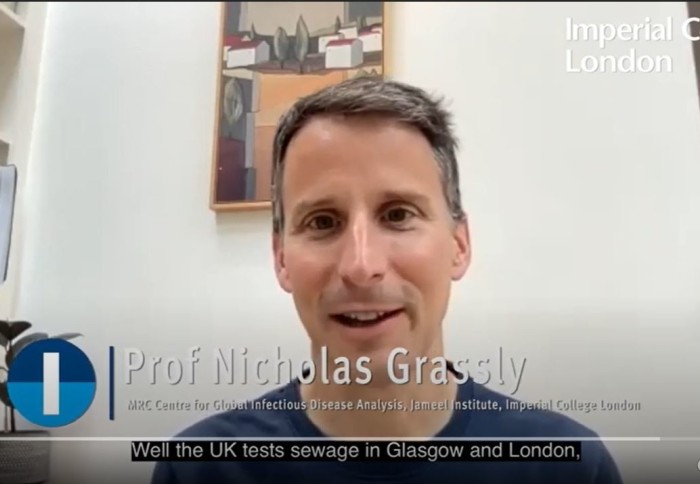Expert Insight: Nick Grassly’s comments on poliovirus detection in the UK
by Ryan O'Hare

Warnings of potential polio cases in London hit the headlines last month after the virus was detected at two points in the city’s sewage system.
One key voice to emerge in the chorus of expert commentary was Imperial’s Nicholas Grassly, from the School of Public Health, whose work focuses on the surveillance and eradication of the virus.
Through media interviews, as well as a rapid reaction piece in the BMJ, he explained the likely origin of the virus – confirmed to be vaccine-derived poliovirus. He addressed public health concerns, and crucially, highlighted the importance of parents ensuring their children’s vaccines are up to date.
What is polio and how does it affect people?
“Poliovirus is really a gut infection that is spread from person to person, typically by contamination of food and water. Every few hundred infections though it can result in paralysis – the disease we know as polio,” he said, in Science in Context for the MRC Centre for Global Infectious Disease Analysis.
Is it unusual to detect poliovirus in the UK’s sewage?
“Polio persists in some of the poorest parts of the world and the UK quite frequently detects imported virus in sewage samples,” he told the Science Media Centre.
“In this case, genetically related viruses have been detected since February in sewage from north and east London suggesting there may be local circulation. Fortunately, so far no one has developed symptoms of the disease.”
The UK HSA reported the virus as being ‘vaccine-derived’, what does this mean?
“The oral polio vaccine contains a weakened, live virus that immunizes us by growing in the intestine for a short period during which it can be detected in stool,” he explained [in comments to the SMC].
“This virus can occasionally be transmitted and very rarely it can spread further to cause an outbreak of vaccine-derived poliovirus. Whilst rare, these vaccine-derived polioviruses have lost their attenuating mutations and and are just as likely as the wild-type strain to cause paralysis.”
So where did the virus detected in London sewage come from?
“Most likely this arrived with a traveller coming from one of the countries that are still using oral poliovirus vaccine,” he told The Guardian’s Science Weekly podcast.
“So in recent months there have been campaigns to attempt to eradicate polio from Afghanistan and Pakistan, and it could well be a traveller from one of those countries inadvertently bringing the virus in their gut and then shedding that virus into our sewers.”
Why are countries still using ‘live’ oral polio vaccine?
“The oral vaccine is easy to administer and gives good gut immunity that protects against infection and poliovirus shedding in stool if exposed. It is needed to stop polio outbreaks in countries with poor sanitation where food and water may be contaminated with human waste,” he explained [in comments to the SMC].

Does the UK still use the oral vaccine for polio?
“The UK stopped using the oral polio vaccine in 2004 and now relies on an inactivated polio vaccine (IPV), an injectable vaccine that contains a killed virus incapable of replication,” he writes in the BMJ.
How serious is the situation?
"Only one in a few hundred people are paralysed by polio, even in the unvaccinated population, he told The Mirror. "So far there haven't been any cases of paralysis reported [in the UK], but if the virus spreads it will eventually cause paralysis in an unvaccinated child. The priority now is to identify where it is."
What’s the advice for doctors and healthcare workers?
“I haven’t heard of any cases of polio being reported to date,” he told The Guardian’s Science Weekly. “However, it is important for any clinicians seeing a child with acute flaccid paralysis or sometimes termed acute flaccid myelitis, without an obvious non-infectious cause do take two stool samples from those children to test for the presence of the virus.”
What is the advice to people living in London and across the UK?
“It is important that children are fully up-to-date with their polio vaccines. Until polio is eradicated globally we will continue to face this infectious disease threat,” he warned [in comments to the SMC].
“Parents in London and across the UK need to ensure that their children are up to date with their vaccines,” he added, writing in the BMJ. “In London, 13% of infants aged 12 months have not been fully vaccinated against polio and in some London boroughs this number is substantially higher, reaching 32% in Hackney and the City of London. Delayed vaccination or a failure to be vaccinated puts these children at risk of polio paralysis.”
Nicholas Grassly is Professor of Infectious Disease & Vaccine Epidemiology within Imperial’s School of Public Health.
-
The full statement from the UK HSA is available on the Gov.uk website.
The full episode of The Guardian’s Science Weekly podcast is available online.
The opinion piece was published in the BMJ.
The episode of ‘Science in Context’ for the MRC Centre for Global Infectious Disease Analysis, is available online.
Article text (excluding photos or graphics) © Imperial College London.
Photos and graphics subject to third party copyright used with permission or © Imperial College London.
Reporter
Ryan O'Hare
Communications Division
